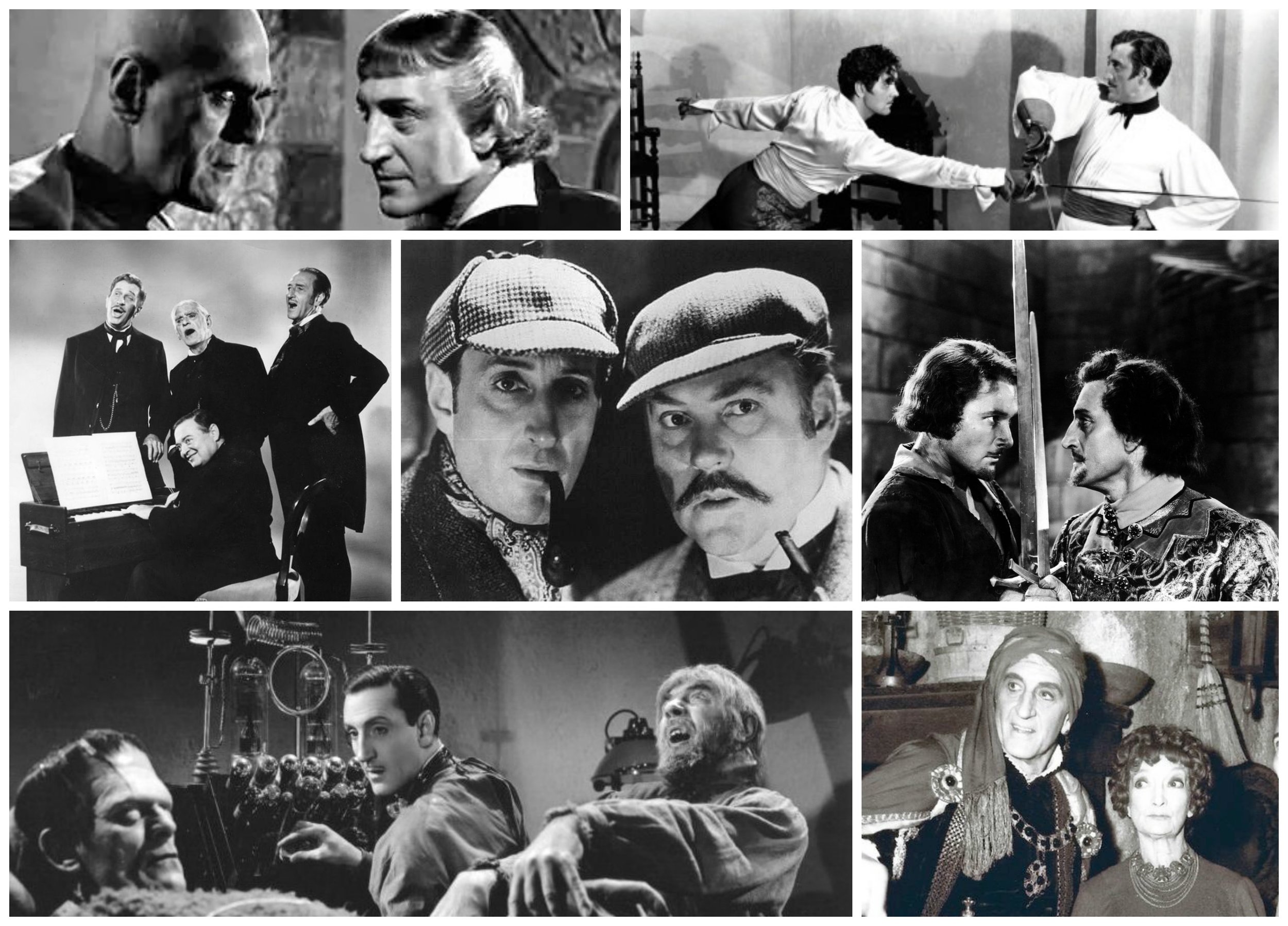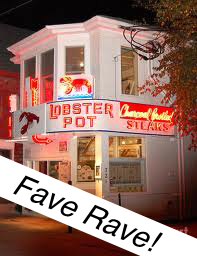A New George Sweet Doorway Mystery… “A Door… ajar…” (Part Four)
/1990: …. How could I ever really be cross with my landlady, no matter how often she barged through my life? Her bonhomie, generous spirit, and basically goodhearted though mischievous sense of humor won me over every time, and what about her bringing me the most heartbreakingly delicious samples of her baking and cooking? I didn’t go a single day without a basket filled with too many croissants for breakfast, the crock full of bubbling Boeuf Bourguignon a la Bretagne for lunch, or the Charlotte Russe Flambée, the Mousse Madeleine aux Macarons à la Noix de Coco, or the Crème brûlée à la Goyave for desserts or for late night snacks. I had put on at least twelve pounds in the last few months, and I managed to cover it with my painter’s smock, although she took great delight in pinching my midsection and pointing it out to neighbors laughing when I would pass her on the front stoop.
About a week after she told me the story of Veronique, Mme. P invited herself up to my garret for dinner… and what a dinner she brought! I had no idea we were spending a charming soirée together until I got home from painting all day on the Place du Tertre. I was slightly surprised not to see her doing her usual chores at that hour; sweeping the front stoop, watering the pots of crimson geraniums, the icy white “million bells”, and the dwarf morning glories in twilight blue on the window sills and hanging on the walls around the old paneled front door, or gossiping with her comrades… often about stoop-sweeping or flower pots… or the ultimate; food. As I said, there was no sign of Mme. P, and I began to trudge up the stairs lugging my French artist case with the little collapsible easel attached that old Monsieur Lapingris had gifted me (it had been his grandfather’s). I adored that case, covered with dents and dings, and a hundred loving drips and splashes of paint that lived on the cityscapes that Lapingris’ grandfather had done back in the 1890s. That case had character and, I hoped, good luck and inspiration in its bones for me and my career. As I neared the top floor, I was greeted warmly by Mme. P’s lusty alto humming, quite lovely actually, like a bassoon, coming from my front door which stood slightly open… and the smell of what turned out to be Pâté de Canard en Croûte. She had set the little chestnut country table off the kitchenette with a blue and white checked tablecloth, cotton napkins folded like bird-of-paradise blooms, and a mismatched assortment of old but beautiful silver, some of which might actually have been somewhat valuable. She was typically French in that regard… living comfortably and unselfconsciously with mixes of antiques hundreds of years old and junk and flea market finds bought for a few francs.
She heard me creak the floor at my entryway, and beckoned me in with a hearty flourish as if it was her home and those were her candles that she was lighting in the sconces and candelabra. I must admit I would have been delighted for her company, even if there hadn’t been a delicious dinner included. Mme. P definitely did bring a joie de vivre into my rather grey life. No matter how much I tried to be grateful for my sabbatical in the most beautiful city in the world, it was truly Mme. P who made it almost something out of a movie! Week after week, day after day… and sometimes hour to hour. And those hours stretched into lifetimes… no! Not stretched! That sounds as if they were tedious… No, they FILLED into lifetimes. Each of her stories, told over candlelight and a sumptuous meal of tastes that I had never before imagined became a new alternate lifetime for me. Another lifetime filled with its own sights, sounds, smells; its own characters with their hopes, dreams, fears, and sometimes, secrets… their secrets alone swamped and blotted out the bland reality of my small life. I guess my eyes revealed all this, because she stopped her merry humming and came very close to my face, her deep blue eyes turning lavender in the candle glow… and she smiled… so gently. “Does someone want a story?”… and I said, “yes.”…
1950: Phillipe Mansard stood at the edge of the terrace filled with all the love a man’s heart could hold for the lovely wife humming at the stove inside. The heavy rich smell of étouffée wafted out of the door that sat ajar, and he looked first at the glow from the living room and then back again over the street. She came out behind him, wrapped her arms around his waist, and it seemed the whole world was theirs as they looked down from their perfect perch above the fray of the city, out of the way and seemingly forgotten. Forgotten now, but only a few years earlier, with Paris overrun with the German army and at the complete mercy of its Gestapo and God knows how many collaborators, Phillipe and Celeste Mansard played their part in a shocking turn of events that changed history. And it had been her idea. Behind those flashing green eyes, it had been her idea.
For it was during the occupation that they joined the French Resistance, not as saboteurs or spies exactly… but as cooks. With a reputation so exclusive that only the highest officers and officials were able to partake of their gourmet fare. They had already attended the finest schools, apprenticed in and then owned the best restaurants, and built a network of fellow chefs across the country. And cleverly, they decided at the first signs of France falling to the German onslaught, to appear to capitulate, to actually embrace their invaders as favored customers. So clever were they that their Nazi patrons were never suspicious of their true motives, nor were their French suppliers and neighbors ever in doubt about their true and secret loyalty.
And so, on the stormy evening of June 5th, 1944, the Mansards and their cadre of fellow chefs across the French countryside invited their various “special” German diners to partake of a “Fête à l'été”, A Feast for the Coming of Summer. Chefs in over a dozen towns and villages had been planning, shopping, and preparing for weeks; coordinating their orders and strategies in seemingly innocent but coded grocery lists and shared recipes, all by telegram, and right under the noses of their tragically gullible enemies. The Nazi high command was so flattered to be fawned over so lavishly, they never suspected. And so, on that dreadful evening, with wind howling and rain pummeling the city in sheets, the Mansards welcomed their soaked but grateful guests into their rooftop maisonette for a dinner never to be forgotten. They had asked several of their suppliers to come help serve the many courses. Two wine merchants were the sommeliers, the fishmonger, two bakers, and the cheese merchant served as waiters… and four of Phillipe’s butchers were to help Celeste in the kitchen. Phillipe would act as host and raconteur, and oh, how charming he could be with friend and foe alike. He had been a brilliant student as a young boy; the pride of his parents. And his talent in history was especially noted. Imagine his teachers’ and parents’ shock when he quoted Machiavelli… in Renaissance Italian; “La vendetta è un piatto che va servito freddo.” Revenge is a dish best served cold.
As the lights were dimmed, and the candles on the table and in the wall sconces were lit, the champagne was poured for the eight Nazi officers, now in their T-shirts as their uniform tunics with their bright ribbons and twinkling medals hung up to dry in the toasty pantry. How grateful they were for the informal hospitality and friendship that the Mansards had always shown them. Phillipe clinked his glass with a sterling fork to propose a toast and a salute to his “guests”. First he smiled that unforgivably handsome smile that had broken the hearts of dozens of young girls in his youth, but had won him the heart of the luminous Celeste in his manhood. He flattered his guests and thanked them for coming out on such an awful night, and then brought everyone to gales of laughter when he noted the irony of the tempest outside and the banquet being a celebration of the coming Summer, remarking especially on the word “Fête”… feast.
The candle flames flickered merrily as if they too were in on the joke, and then with a flourish, he concluded with “La vendetta è un piatto che va servito freddo.”… His guests raised their glasses and drank deeply, not quite understanding the Italian, or was it Greek?… or noticing that their host’s staff had come out from the pantry and kitchen, and from the terrace outside… carrying knives, a mallet, two hatchets, and the heavy coal shovel. By flickering candlelight and with the rain pouring in sheets down the windows and skylights, no neighbor would ever have been able to see what unfolded… even if anyone had bothered to look. And the roar of the wind, the pounding of the rain, and the rolling thunder muffled the brief cries of agony and terror that could never penetrate the tightly closed windows of the surrounding homes. Ah well… It was over soon enough… at 8:15 or so… and in every one of the other shuttered cafés, private dining salons, and cozy maisonettes that had hosted their own Fêtes à l'été in other parts of the countryside… with the same unforgiving and implacable conclusions. While Frenchmen and women and their children sheltered on that stormy night, huddling around cozy fires and delicious dinners, and then off to bed, never suspecting how the world would change over the next few hours… in certain kitchens, basements, butcher shops, and then finally on the beaches of Normandy.
You see, in the appalling and astounding turmoil of D-Day, no one had time to notice or figure out what had happened to over 100 important Nazi officers and Gestapo officials. It was assumed that they had been swallowed into the maelstrom of the greatest invasion that the world had ever seen. They were either among the dead or the deserters… whatever. But oh, the rippling consequences of those vanished 100… confusion, miscommunications, orders not followed or even given. The crumbling chain of command, the avalanche of missing reports and missed opportunities, panic-driven gossip, rumors… oh, the consequences as the outside world threw all its resources and a generation of young men onto the shores of Normandy.
Meanwhile, each household of conspirators “processed” their guests into a luxurious array of delicacies; either as entrées and appetizers in their restaurants, or as fine sausages, pâtes, and meats for baguette lunches. Any and every part was used, just as slaughtered livestock would be. “Sweetbreads” to soup bones… all of it. ALL of it… And all of it given exclusively and generously to German soldiers and officers over the coming weeks as their fortunes faded and began to reverse. What a lovely gift from their French sympathizers. How comforting. Something to write home about to their grateful mothers in the Fatherland.
Now, only a few short years later, Phillipe would often drift in reverie doing his gardening. How could five years feel like five lifetimes? Was it that even in simplicity, his life was so rich, so full with his beautiful and brave Celeste? Dicing the shallots, making the bed, laying the tablecloth, or playing cards with friends, he often wondered… “If only the world knew that its very existence was due to the woman sitting here playing bridge.”
As he finished weeding the little planters of their dead twigs and crumbling leaves, Monsieur Mansard looked over his work with a sigh of melancholy as a small tear of nostalgia trickled down his stubbled cheek… His lovely wife, returning again from the kitchen, saw his sweet tired face and whispered, "Dormer vous?". He smiled at her funny little pun… the kind that she would try on him in their special language that old married people share after so many years of worries, joys, triumph and loss… “Monsieur Mansard, dormer vous?” she repeated. And he nodded, rising slowly, putting his arm around her, and padding off to their bedroom with its little crackling fire. Celeste suddenly caught herself, slipped out of his strong arm, and went back to the door to the terrace. She closed and latched it against the chilly air, and looked up. If only the fog and mist would clear so that perhaps she could see through the skylight to the stars above, but all she could do was watch the neighbors' cat walk across it and disappear into the darkness of the night. And then, as the first snowflakes beginning to collect on the skylight. “Yes”, she thought as she pressed her hand to her tummy. “Tonight is a lovely night to tell him about the baby.”…
(End of Part Four. Stay tuned for Part Five of A New George Sweet Doorway Mystery… “A Door… ajar…")
[Want to read other fun and funny stories here on SybilSez.com? Just enter any topic that pops into your head in the "search" window on the upper right! Who knows what might come up?...and feel free to share them with your friends!]











